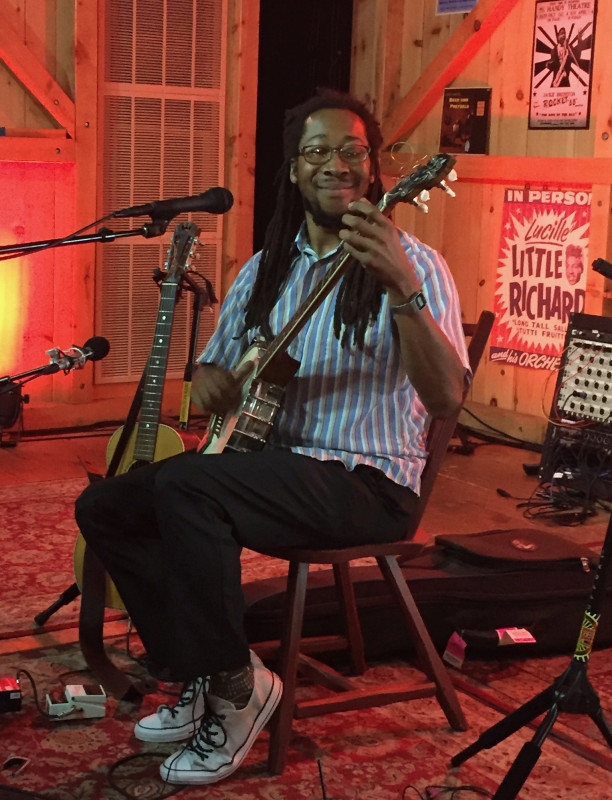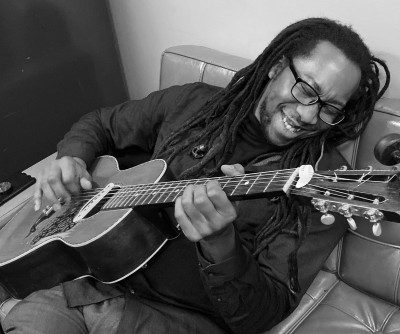The Deep Blues According to Hubby Jenkins
by Frank Matheis, as published in Living Blues magazine.Issue #253.Vol. 49, #1 . February 2018.

When the Carolina Chocolate Drops astoundingly won the Grammy in 2013 for their fifth album, The Real Negro Jig, that seismic event was unnoticed by many. It proved that African American pre-blues, jug band, black Appalachian banjo and fiddle music, many of the precursors to the blues that had mostly been under the radar of the mainstream blues world, have resurged with a fury. The songsters are back!
The number of young African American musicians who are exploring the deep roots is ever growing. Besides players like Jerron Paxton and Ben Hunter, the former members of the now disbanded Carolina Chocolate Drops are spreading their deep roots revival all over the country. It’s only right that a center of that scene should be in the birthplace of the 1960s folk-and-blues-revival: New York. This time it’s not Greenwich Village but in hip Brooklyn in the Jalopy Theater. Besides local peers like Jerron Paxton and Valerie & Ben Turner, there is the ebullient, immensely talented, dreadlocked multi-instrumentalist, Hubby Jenkins, tall and lanky with strikingly long ‘Robert Johnson fingers’. He still actively works with his former bandmate, the 2017 McArthur Foundation Fellow, Rhiannon Giddens. All of the Chocolate Drops – Giddens, Dom Flemons and Leyla McCalla have released exciting, critically acclaimed solo projects. Now the immensely talented Hubby Jenkins just came out with his own, powerful self-titled album.
He plays guitar, banjo, mandolin, claps the bones and sings in a rich tenor. Jenkins masters all these instruments and seamlessly slides from black Appalachian, North Carolina banjo to deep roots blues. Hearing this young guy perform Blind Willie Johnson or Fred McDowell will astonish even the most seasoned blues aficionado, impressing that this fierce slide guitarist and fingerpicker, and a superb singer, is the joyous embodiment of the future of acoustic blues. He brilliantly exemplifies the commonality of the new generation of African American songsters, in spirt and music: intelligent, articulate, well-educated in the history of the music, energetic and exciting, with something important to say lyrically – all with virtuosic instrumental skills. Yes, all that!
LB caught up with the articulate young bard, “I’m a guy from Brooklyn, New York. I find my passion and peace, my range and rage, and my love, through old-time music. That’s the reason I feel like I can share all of my feelings and beliefs and stride through old-time music. The blues I love is ’20s, ‘30s prewar blues. That’s Charlie Jordan, Skip James, Blind Willie McTell, Blind Willie Johnson, Fred McDowell, Kid Prince Moore – all that…
When you think of the original blues players, you think about who they were being recorded by. They did not necessarily have the freedom to speak as openly as they might have wanted to. I’m talking of course about the ‘20s and ‘30s. If you think about why there are a million blues songs about trains, about missing the train, about people that you love leaving on trains, that’s because there is a direct connection to the African American diaspora –millions of people leaving the South at the dead of night because of the dangers of Jim Crow, needing to escape social injustice and violence of all sorts. Hearing that in the song gives you a sense of history and of the pain and the injustices they were going through. I think in its own way, preserving those songs is a way of preserving a type of resistance.
I’ve become very interested in broadening the idea of what old-time music is. When I first heard the term “old-time” I always just thought of fiddle and banjo. I’ve now gotten to a place where I look at American old-time music to include country blues, traditional jazz, early country, gospel, etc. That allows me to bring up questions that touch me, that I think are powerful, relevant, fun, and beautiful. I grew up listening to hip hop, and I still listen to a lot of rap, and skits are a big important part of rap too. I always want to include those types of things in my albums. With the sociopolitical climate, I feel a certain responsibility to talk about it. All of it affects everyone directly and daily. As a black man in America I feel it is extra urgent to speak out. I try to present music that I love, that is historically interesting, and give a context about the history around the time period – but also being able to connect it to our experiences today.
I joined Carolina Chocolate Drops around 2010, and for the last couple of years I’ve been touring with Rhiannon Giddens. I’ve played on both of her solo albums.
I was raised in Brooklyn. Born here and lived here my whole life so far but if Trump gets too crazy I might have to move to Berlin. I was raised in the Brooklyn School system and went to PS 11 in Clinton Hills, then I to Brooklyn Technical High School, which specialized in science and math but they had a classical music program. I did the jazz band for one year and switched to classical. I played alto saxophone from about the age of five until the sophomore year of high school, when I switched to cello and viola in the school orchestra and all the school musicals, plays – I played in the pit. In high school, I started playing bass and drums and had a bunch of crappy bands. When I was around 18-19, I got into Bob Dylan really hard. Through Dylan I got into country blues. I bought my first guitar and quit my job and starting busking and traveling a bit and getting deeper into country blues. Through playing country blues and reading about American folk music and the history of old-time music I got into the banjo and then the mandolin. After five or six years of playing country blues I started banjo before joining Chocolate Drops. When I first joined that band, we were doing about 250 gigs a year, so it was a lot of banjo playing and guitar.
I first got into Appalachian music and banjo music in general from listening to the Harry Smith Folk Anthology (The Anthology of American Folk Music). That was my bible when I first got into this music. Our connection to the music was the New York folk scene of the ‘60s and ‘50s. I was drawn to the West Village, MacDougal Street, Washington Square Park – because this was like the Mecca for the New York folk scene. That was my first connection. When I joined Chocolate Drops, those guys were steeped in that, and they spent a lot of time with Joe Thompson to learn North Carolinian style of fiddle and banjo and I loved it.

It’s very rare that I write a song. You could call me an interpreter or a cover artist, you know it has a lot of negative connotations – a folk artist. When I pick songs, they’re songs that have some sort of emotional resonance – happy, sad, dark, political – whatever it is – songs that I think have an interesting historical story. Sometimes I think they’re plain cool. Getting into old-time music through country blues, and through Bob Dylan, I came to think about these musicians as songwriters and as artists. There was no other term like singer-songwriter back then. But Skip James wrote all his songs. All those guys were singer/songwriters.
When I want to learn a song, I listen to it over and over again for a couple of days and then sit with it and play along with it. A guy named Peter Stampfel, who started the Holy Modal Rounders, taught me that I don’t need to sound like the record –Robert Johnson already made it sound that way. Make it sound like Hubby Jenkins: play it like you. When I go back to learn these songs, it is learning the language and the colors of the song and then putting your own voice on it, your own spin and experience.
I remember the first time I really understood Skip James. I had a girlfriend cheat on me a long time ago in my house and I had to kick her out. I sat alone and I put on Devil Got My Woman Blues and I got it. When I’m picking a blues song I think about how the moments in my life to come through in the song.”
